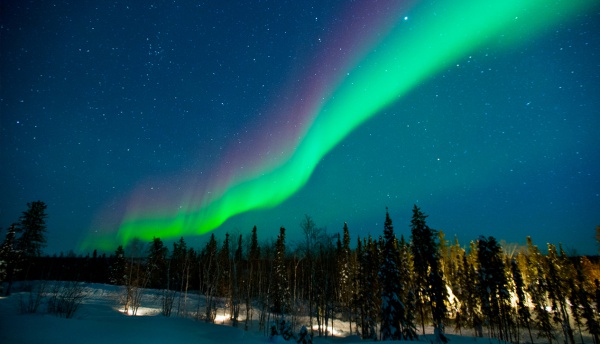Are you hoping to spot the Northern Lights this year, but don’t have the time, money or patience to fly halfway around the world to see them? Then this article is for you. We’ve rounded up some of the best places in North America to spot the Aurora, followed by a checklist of everything you’ll need to make the most of your trip.
RELATED: Canada’s coolest town in every province and territory
Best places to see the Northern Lights in North America
Glaze at the green glow over Cook County, MN | Photo by Jason Carpenter – Flickr cc
Cook County, Minnesota
This sparsely populated corner of Minnesota is known as one of the best places in the lower 48 states to catch a glimpse of the Northern Lights. Tucked away in the far northeast corner of the state between Lake Superior and the Canadian Border, Cook County‘s exact geographical position affords many opportunities to spot the green glow. Visitors can also bundle up and take advantage of the great outdoors in Superior National Forest.
There is no place like Alaska for the Northern Lights! – Photo by Mike Juvrud – Flickr cc
Anchorage, Alaska
Way up in Anchorage, your chance of seeing the Northern Lights are much higher than most of the lower 48 and even many parts of Canada. The tall mountains and larger than life landscapes will make an Aurora trip to Alaska even more memorable and flights prices to Alaska’s largest city are surprisingly within reach.
A trip to Canada to see the Northern Lights is sure to be worth it – Photo by Danial Bradford – Flickr cc
Banff, Canada
With or without the Northern Lights, Banff National Park in Canada is a special place. If you’re lucky enough to catch Banff’s night skies filled with the dancing Aurora it will be a sight you won’t soon forget. The jagged mountains and stunning lakes make a great canvas for the Aurora to paint its light. While Yellowknife in the Northwest Territories might have a better chance at a sighting, Banff is easier to get to (it’s an easy reach from Calgary) and has some other great activities in case the Aurora doesn’t cooperate.
Catch the Northern Lights over the bridge that connects upper and lower Michigan. – Photo by Wall Boat – Flickr cc
The Upper Peninsula of Michigan
Another closer-to-home destination to see the Northern Lights is in Northern Michigan. Similar to Cook County, Minnesota, the U.P. falls in the natural path of the Aurora, which dips down over the Great Lakes. One particularly promising option is Headlands International Dark Sky Park near Mackinaw City. The 600-acre swath of old-growth forest sits on an undeveloped shore of Lake Michigan, which ensures minimal levels of light pollution.
See the dancing Aurora in Northern Montana – Photo by Diana Robinson – Flickr cc
Montana
With some solar activity, the top half of Montana has the potential to put on a good Northern Lights show. This is another stunning area of the country with or without the lights. If you time your trip toward the end of spring you might have a chance to enjoy stunning Glacier National Park with a splash of Aurora colors.
ALSO: Light up your life withe Orbitz Rewards and earn instantly on flights and hotels!
Northern Lights checklist:
- Time your trip Generally some of the best times to see the Northern Lights in North America are during the winter and in the early spring. Typically, the night sky in the summer doesn’t get dark enough. Meanwhile, fall tends to be cloudy, blocking our view of this phenomenon.
- Head north As you might have guessed from the name, the Northern Lights are easier to spot the farther north you travel. Without extreme activity you’re realistically only able to see the Northern Lights in the aforementioned states, as well as North Dakota, Wisconsin and Maine.
- Wait for clear skies The Aurora happens when particles in the atmosphere are disrupted by solar activity, so if there are clouds, they’re going to block your view of the show.
- Check for solar storms The more solar activity, the better your chances to see the Northern Lights. Check the Aurora Forecast here.
- Get out of the city Light pollution from city lights can hurt your chances of seeing the faint green lights of the Aurora, so it’s best to get out into nature to see this display.
